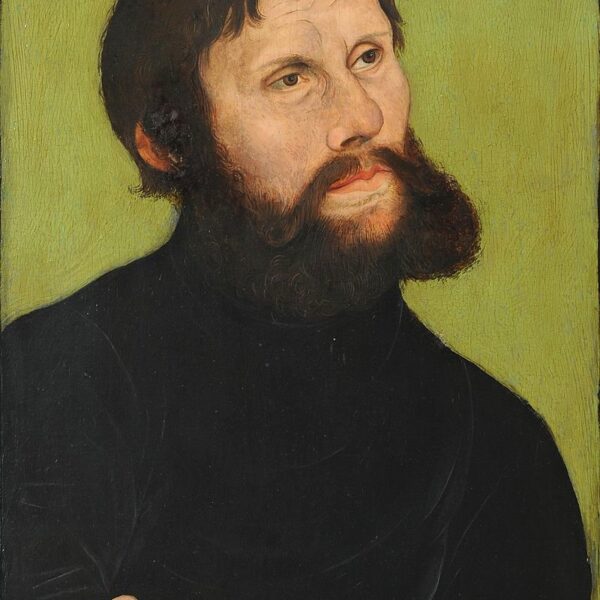
Home › Sermons › The Truth Will Make You Fearless
The Truth Will Make You Fearless
Message for Reformation Sunday, Year C (10/26/2025)
John 8:31-36
“You will know the truth, and the truth will make you free.”
That’s the gospel message each and every Reformation Sunday, but it’s never been quite as straightforward as we might like. Even Jesus’ first listeners misunderstood what he meant by freedom. And the question remains to this day: free from what, exactly?
Luther’s 16th-century response would refer to that trio of oppressors, “sin, death, and the devil,” which is to say all the forces that actively seek to separate us from the love of God. The gospel truth, in other words, liberates us from anything that presents itself as an ultimate reality apart from the grace of Christ. All the others are pretenders, according to the good news; only Christ reigns– both in our hearts and in the world– and he reigns by his grace and peace.
Bear in mind that this message was a serious threat to the powers and principalities in 16th-century Europe. Luther’s insistence on the efficacy of grace alone undercut the church’s monopoly on salvation, which it exploited through the sale of plenary indulgences, or promises of salvation printed on paper. This pesky German monk was a “destructive force, undermining the foundations of faith,”[1] the emperor blustered when Luther refused to recant his position at the Diet of Worms in 1521. As a consequence, he was excommunicated from the church and branded an outlaw in one fell swoop.
That event changed Luther’s life, making him a permanent mark for religious and political hit men alike. It was in the wake of the emperor’s condemnation that Luther was forced into hiding at Wartburg Castle for almost a year. Imagine how lonely and vulnerable he must have felt in that cold little study. There was no guarantee in 1521 that Luther’s movement would survive a reactionary onslaught by the church, no guarantee that the risk he had taken would pay off. Even as the message of grace gained traction– even as the Reformation took root across Europe and eventually around the world– Luther lived with a target on his back.
And yet, he was free– free from fear, as in the case of so many reformers over the ages. That is not to say Luther did not know fear, but rather his gospel-centered faith enabled him to overcome it, and to speak truth boldly to both religious and temporal power.
Luther could never be accused of driving a wedge between faith and politics, as many are wont to do, but recognized both the responsibility and the failure of governing authorities to serve God and their constituents. Hear, for instance, this scathing little commentary from his 1523 treatise Temporal Authority: To What Extent It Should Be Obeyed (forgive the heavily gendered language):
There are very few princes who are not regarded as fools or scoundrels; that is because they show themselves to be so. The common man is learning to think, and the scourge of princes… is gathering force among the mob and with the common man. I fear there will be no way to avert it, unless the princes conduct themselves in a princely manner and begin again to rule decently and reasonably. Men will not, men cannot, men refuse to endure your tyranny and wantonness much longer. Dear princes and lords be wise and guide yourselves accordingly. God will no longer tolerate it. The world is no longer what it once was, when you hunted and drove the people like game. Abandon therefore your wicked use of force, give thought to dealing justly, and let God’s word have its way, as it will anyway and must and shall; you cannot prevent it.[2]
“Let God’s word have its way,” that is, let the truth continue to make people free, and become part of the solution for once. If a governing authority was to exercise power faithfully, Luther continued,
he must give consideration and attention to his subjects, and really devote himself to it. This he does when he directs his every thought to making himself useful and beneficial to them; when instead of thinking, “The land and people belong to me, I will do what best pleases me,” he thinks rather, “I belong to the land and the people, I shall do what is useful and good for them.”[3]
I’m reminded of a similar reflection by Martin Luther King, Jr., a fearless reformer in his own right, who wrote from his cell at Birmingham City Jail: “Oppressed people cannot remain oppressed forever. The urge for freedom will eventually come. [And yet] human progress never rolls in on wheels of inevitability. It comes through the tireless efforts and persistent work of [people] willing to be co-workers with God….”[4]
Friends, gospel freedom permits us to take action in every sphere of life for the sake of the world as it should be– a world of greater love and justice and peace– and to call our leaders to account when they neglect their duties. “I can and will no longer just look at my ungracious lords and angry nobles,” Luther concluded, “I shall have to resist them, at least with words.”[5] You will know the truth, and the truth will make you fearless.
That’s a promise for would-be reformers in every generation. So take heart, people of God. In time, God’s kingdom will come on Earth as in heaven. In every way possible, let it come through us.
[1] Heiko A. Oberman, Luther: Man between God and the Devil, 203.
[2] Luther’s Works, vol. 45 (Muhlenberg Press 1962), 116-17.
[3] Ibid. 120.
[4] A Testament of Hope, 297, 296.
[5] Luther’s Works, vol. 45 (Muhlenberg Press 1962), 84-5.
Liturgy © 2022 Augsburg Fortress. All rights reserved. Used by permission under OneLicense # A-706920.
Liturgy © True Vine Music (TrueVinemusic.com). All rights reserved. Used by permission under CCLI license #11177466.

